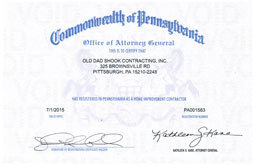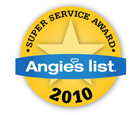There are a number of roofing systems available on the market for flat and low slope roofs. We can install any of the most common applications. I will list a few here and describe the property’s, benefits and any drawbacks.
Hot tar, Built up, Tar and gravel roofs.
These old style roofs have become somewhat a thing of the past as far as flat roofs go. There are still some companies installing them I hear, and we do repair these kind of roofs, but with the environmental problems, high cost, danger, and inconsistent applications we no longer install them new.
Torch Down, Modified, Brai, Modified Asphalt.
These roofs are the simplest roofs to install over top the present roof and are often offered by small companies because they require little equipment and can be done with small crews of two men. We also have stopped installing these roofs for the following reasons. Open flame torches that resemble flamethrowers are extremely dangerous used on many of the older buildings around Pittsburgh. Most Insurance companies specifically exclude coverage from liability for these applications. If you are having this kind of roof installed, call the roofers insurance company yourself and ask them if he is covered for “torch down” installations. Secondly there is little or no manufacture participation in the warranty service. The melting of the roofing while its being installed is highly subjective and the material can easily be ruined by uneven or overheating. Of course if its under heated, then the material lifts up and seams come apart. It only comes in three foot wide rolls so there are lots of seams to contend with later.
Rubber, E.P.D.M ( fully adhered, mechanically attached, ballasted. )
These roofs became very popular years ago because you can get large sheets and that means less seams to deal with….or leak later. They are most suitable for larger industrial buildings and schools. We don’t recommend them for roofs with a lot things to cut around. There are a number of setbacks to rubber as it ages. Although the product does not crack like asphalt will, It does shrink. This can be a huge problem unless the roof was put done by an absolute rubber expert. Also, the glue in the seams will eventually dry up and need redone. It is a fragile roof, and will not withstand much physical abuse, foot traffic or any repairs with dissimilar materials. ( we see it all the time often performed by handymen ) Once again there is little manufacture participation unless you pay for it, and then it gets very costly. We are phasing out of new rubber installations as well. However,we do repairs on every type of flat roof made.
Well that’s the first three I’ve named and we quit doing them all….what the heck do we install on a flat roof then???
Self adhesive modified, SBS, peel and stick.
These roofs are similar to the modified asphalt roofs that you torch down, except “no torches”. We don’t burn down your building, nor do we damage the product while installing it. They do a great job on smaller flat roofs and even residential flat roofs that need color coordinated surfacing to integrate with shingle roofs. They come in either one, two, or three plys depending on how long of a warranty you would like. There are some limitations to when and where these types of roofs can be installed. Such as, the roof has to have positive drainage, and it cant be below 50 degrees or so when installed.
P.V.C. Poly Vinyl Chloride, TPO, Thermoplastic
For larger jobs this is roof of choice for us. We use the PVC Roofing manufactured by Durolast. It has many desirable characteristics that have convinced us to use this product over all the others. It is white instead of black…doesn’t absorb heat. It doesn’t crack like asphalt or shrink like rubber. It uses no glues. Heat welded seams. Ponding water is no exclusion to warranty. It can be installed in any temperature. It has a 15 year guarantee which is fully participated in by the manufacture at no cost. Warranty covers labor and material without exclusions. Ask for some literature from us.
Asphalt roof coating, Fiberglass coating, Aluminum Coating.
This is considered repairs, “patch and coat” if you will. If your roof is not in too bad of shape, we can offer this type of repair where we reseal all the penetrations with roof cement and membrane, and then coat the roof with a compatible asphalt coating material. There are strict limitations as to when this type of work can be performed properly.
Keep in mind, any flat roof that is soaking wet underneath, should never have any kind of roof installed over top of it. This is the most common mistake roofers and building owners make. The roof and its insulation…or any other substrate must be relatively dry to go over top with another roof system. Ask for a core sample.
I hope this gives you a little help in understanding some of many types of flat roofing materials offered today. Of course you can always call us for a free estimate on your roof. We will let you know at that time what application seems right for you.






